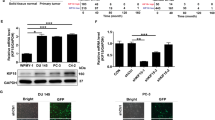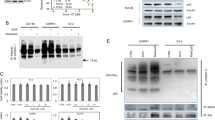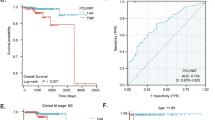Abstract
iASPP is a member of the apoptosis-stimulating protein of p53 (ASPP) family and an evolutionarily conserved inhibitor of p53. Higher levels of iASPP proteins were examined in paraffin-embedded sections collected from 30 patients with prostate cancer using an immunohistochemical method. We found that specially knocking down iASPP with lentivirus-mediated small interfering RNA inhibited the growth, in vitro colony-forming capacity and in vivo tumorigenesis of p53-defective prostate cancer cells. Importantly, inhibition of iASPP induced cell apoptosis, which confers the inhibitory effect on cell survival. We conclude that iASPP is essential for prostate cancer cellular proliferation and survival and may be a potential target for the gene therapy for prostate cancer.
This is a preview of subscription content, access via your institution
Access options
Subscribe to this journal
Receive 4 print issues and online access
$259.00 per year
only $64.75 per issue
Buy this article
- Purchase on Springer Link
- Instant access to full article PDF
Prices may be subject to local taxes which are calculated during checkout





Similar content being viewed by others
References
Jemal A, Siegel R, Ward E, Hao Y, Xu J, Murray T et al. Cancer statistics, 2008. CA Cancer J Clin 2008; 58: 71–96.
Parkin DM, Bray F, Ferlay J, Pisani P . Global cancer statistics, 2002. CA Cancer J Clin 2005; 55: 74–108.
Vousden KH, Lane DP . p53 in health and disease. Nat Rev Mol Cell Bio 2007; 8: 275–283.
Sullivan A, Lu X . ASPP: a new family of oncogenes and tumour suppressor genes. Brit J Cancer 2007; 96: 196–200.
Samuels-Lev Y, O’Connor DJ, Bergamaschi D, Trigiante G, Hsieh JK, Zhong S et al. ASPP proteins specifically stimulate the apoptotic function of p53. Mol Cell 2001; 8: 781–794.
Bergamaschi D, Samuels Y, Jin B, Duraisingham S, Crook T, Lu X . ASPP1 and ASPP2: common activators of p53 family members. Mol Cell Biol 2004; 24: 1341–1350.
Bell HS, Ryan KM . iASPP inhibition. increased options in targeting the p53 family for cancer therapy. Cancer Res 2008; 68: 4959–4962.
Bergamaschi D, Samuels Y, O’Neil NJ, Trigiante G, Crook T, Hsieh JK et al. iASPP oncoprotein is a key inhibitor of p53 conserved from worm to human. Nat Genet 2003; 33: 162–167.
Gao X, Xin HM, Lu X, Zhong S, Gu SZ, Chen J . Effect of RNA interference of iASPP on the apoptosis in MCF-7 breast cancer cells. Cancer Invest 2008; 26: 878–882.
Agarwal MK, Hastak K, Jackson MW, Breit SN, Stark GR, Agarwal ML . Macrophage inhibitory cytokine 1 mediates a p53-dependent protective arrest in S phase in response to starvation for DNA precursors. Proc Natl Acad Sci USA 2006; 103: 16278–16283.
Mohapatra S, Chu B, Zhao X, Pledger WJ . Accumulation of p53 and reductions in XIAP abundance promote the apoptosis of prostate cancer cells. Cancer Res 2005; 65: 7717–7723.
Gurova KV, Rokhlin OW, Budanov AV, Burdelya LG, Chumakov PM, Cohen MB et al. Cooperation of two mutant p53 alleles contributes to Fas resistance of prostate carcinoma cells. Cancer Res 2003; 63: 2905–2912.
Kawai H, Ishii A, Washiya K, Konno T, Kon H, Yamaya C et al. Estrogen receptor alpha and beta are prognostic factors in non-small cell lung cancer. Clin Cancer Res 2005; 11: 5084–5089.
Arocho A, Chen B, Ladanyi M, Pan Q . Validation of the 2-[DELTA][DELTA]Ct calculation as an alternate method of data analysis for quantitative PCR of BCR-ABL P210 transcripts. Diagnostic Mol Pathol 2006; 15: 56–61.
Xu Y, Wang Z, Wang J, Li J, Wang H, Yue W . Lentivirus-mediated knockdown of cyclin Y (CCNY) inhibits glioma cell proliferation. Oncol Res 2010; 18: 359–364.
Davis ME, Zuckerman JE, Choi CH, Seligson D, Tolcher A, Alabi CA et al. Evidence of RNAi in humans from systemically administered siRNA via targeted nanoparticles. Nature 2010; 464: 1067–1070.
Sinn PL, Sauter SL, McCray PB . Gene therapy progress and prospects: development of improved lentiviral and retroviral vectors-design, biosafety, and production. Gene Ther 2005; 12: 1089–1098.
Wang YH, Wang ZX, Qiu Y, Xiong J, Chen YX, Miao DS et al. Lentivirus-mediated RNAi knockdown of insulin-like growth factor-1 receptor inhibits growth, reduces invasion, and enhances radiosensitivity in human osteosarcoma cells. Mol Cell Biochem 2009; 327: 257–266.
Rowan S, Ludwig RL, Haupt Y, Bates S, Lu X, Oren M et al. Specific loss of apoptotic but not cell-cycle arrest function in a human tumour derived p53 mutant. EMBO J 1996; 15: 827–838.
Bell HS, Ryan KM . iASPP inhibition. increased options in targeting the p53 family for cancer therapy. Cancer Res 2008; 68: 4959–4962.
Author information
Authors and Affiliations
Corresponding author
Ethics declarations
Competing interests
The authors declare no conflict of interest.
Rights and permissions
About this article
Cite this article
Zhang, B., Xiao, H., Chen, J. et al. Inhibitory member of the apoptosis-stimulating protein of p53 (ASPP) family promotes growth and tumorigenesis in human p53-deficient prostate cancer cells. Prostate Cancer Prostatic Dis 14, 219–224 (2011). https://doi.org/10.1038/pcan.2011.25
Received:
Revised:
Accepted:
Published:
Issue Date:
DOI: https://doi.org/10.1038/pcan.2011.25
Keywords
This article is cited by
-
iASPP facilitates tumor growth by promoting mTOR-dependent autophagy in human non-small-cell lung cancer
Cell Death & Disease (2017)
-
Total triterpenoids from Ganoderma Lucidum suppresses prostate cancer cell growth by inducing growth arrest and apoptosis
Journal of Huazhong University of Science and Technology [Medical Sciences] (2015)
-
Nuclear iASPP may facilitate prostate cancer progression
Cell Death & Disease (2014)
-
Elevated expression of iASPP in head and neck squamous cell carcinoma and its clinical significance
Medical Oncology (2012)



